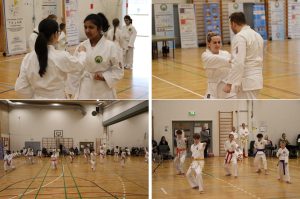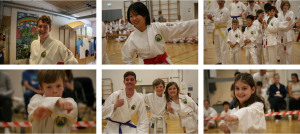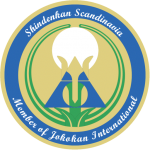The association game
Shindenkan is one of Denmark's oldest martial arts organizations - with a learning curve along the way
Shindenkan is one of Denmark's oldest martial arts organizations founded in 1965-67. From 1965-67 it was primarily taught in the single-track Gensei-ryu Karate-do and from 1988 primarily in the multi-track Yakami Shinsei-ryu Taijutsu & Karate-do and secondarily in the legacy from 1965-67 the single-track Gensei-ryu Karate-do. On April 1, 2009, Shindenkan was honored as the first martial arts organization in Denmark with official recognition as a special association and partner with DGI National Organization and Martial Arts by DGI's national chairman.
In Shindenkan there are members who have been members since 1974, i.e. more than 45 years and only 7 years after the foundation in 1965-67. A great many of the brown and black belts have been members for more than 15 years, with a larger middle group of between 10–30+ years. The age range is from 5–70+ years.
This means that there are many members of Shindenkan who have experienced each other's student, bachelor and university parties, weddings, children's births and schooling, but also each other's joys and sorrows; new dream job, redundancies, marriages as divorces, children's joys as sorrows, birth as death, healthy health as illness, injuries and accidents.
But common to it all is a foundation for support, understanding, an ear or a shoulder, care, joy and pride, security, compassion, understanding and respect, getting back on the horse to "Get together!", help for self-help.
This happens primarily through the local association's community and togetherness, but also on a national level, where children, young people and adults gain new friends, comrades and valuable contacts across the various local associations.
In the old local associations there are culture bearers who can tell the story from "the old days" and in the newer ones there is often an entrepreneurial spirit, innovative and "out of the box" thinking that benefits others.
You can train and be graduated in Shindenkan from 10th kyu to 10th dan, regardless of gender, age, ethnic origin, religion, height, weight, injuries and various handicaps, - we have taken almost everything into account and therefore have concepts after all - there really are no excuses not to train in Shindenkan 😊
Not many national or international organizations can offer that. But you don't get anything as a gift - you have to meet all the minimum requirements in the curriculum handbook, which are the same for everyone. But we support you all the way on YOUR journey and in fulfilling your potential according to your choices and different life cycles.
We have learned this the hard and good way through almost 60 years of history in Denmark, Scandinavia and Europe. Each resource-demanding crisis and clean-up has been followed by a flourishing and peaceful time. It has followed our more than 1,000-year history - and a reflection of people in Danish associational life. The first crisis and clean-up process was in the period 1982-1986 with the transition from more private institutes to the basic ideas of Danish associational life. The next crisis was from 2000-2004, when we went from a less super-elitist competence organization to opening up the breadth with explosive growth as a result. The third and so far last crisis and clean-up period is just over in the wake of the Corona crisis, and has not been so different from other skill-dependent sports. It lasted from 2017-2022, but already started in 2015. We take it as an example in an extremely short version, since this is the purpose of Game Educations – to learn from our and others' mistakes and experiences. To make the world better and more enlightened!
Shindenkan Case 3
Until 2015, the Democratic Federation Shindenkan was built around the preservation and propagation of the 1,000-year-old Japanese world cultural heritage and the multi-track holistic martial arts system; Yakami Shinsei-ryu Taijutsu & Karate-do. The joint curriculum handbook from 2009 distributed the tasks optimally. Holding national standardized competence courses according to the curriculum manual, and subsequent local responsibility for maintaining the competence investment.
It was a highly successful concept. In 2015, vin a giga success after a growth of 3,000 % from 2000-2015 to 1,400 members, which in the strategic plan would soon more than double. A full background check during a black belt training camp revealed the truth, on the basis of growing alarms on the water pipes.
The managements of many local member schools had deliberately told untruths or concealed the truth during general meetings, confederation and Honbu board meetings. It dealt with the local maintenance of the competence investment, which was based on a general meeting-decided, local "Declaration of Faith & Love".
The lie had led to a significant lowering of the multi-track competence level of 60 % of all the members, against a significant increase in the number of members. The explosive growth had brought about local kingdoms with open and hidden special interests.
1) 1998, Japan Honbu Dojo, Iwaki, Cha no yu, The ceremony. 2) 1998, Japan, Iwaki, Yamana-Itotani Sensei – the first Sodenke Sensei, Jokokan International. 3) Takeshi Nishiwaki Renshi, training stay, Denmark, 2003, 4) Shintaro Matsuda Sensei, training stay, Denmark, 2003
There is room for everyone in Shindenkan – The elite as the exerciser.
In Shindenkan, we meet you where you are and take you
take you on a journey.
In Shindenkan, we have a very strong community across schools, ethnicity, age and gender - which we cherish very much.
In Shindenkan, we protect the 1,000-year-old Japanese world cultural heritage and the multi-track holistic martial arts system - Yakami Shinsei-ryu Taijutsu & Karate-do.
And at the same time, unfortunately, special types of people had entered democratically elected positions of trust and management, which no voluntary and unpaid sports association wants, seen in the unbearable clarity of hindsight. Trust is good, but control is better, and unlike the business world, there is no right to hire or fire in association life.
The democratic general assemblies locally and nationally confirmed that everyone was equal before the law according to updated statutes and guidelines, and the democratic majority decisions. And of utmost importance, everyone had to meet, at a standardized minimum level, the common curriculum handbook on which the entire purpose clause was based. Since the level of competence had reached the bottom in 2015, the level of competence had to rise to the common minimum level again from 2009. It ended up taking 7 years, when one 2-year Corona crisis came over.
In terms of competence and action – what does all this mean?
40 % of all the members under a local chief instructor and board, had fulfilled all local as national standardized minimum requirements according to purpose clause, the common curriculum handbook and general assembly resolutions. They met the 2009 minimum competence criteria.
But 60 % didn't do that under a local chief instructor and board - it was the local kingdoms and it was bad. The Shindenkan organization's explosive growth and democratic, trust-based association management had inadvertently led to a division into "Elite- and 4 division" local schools.
The competence level for 60 % was a minimum of three-four belt degrees lower for degrees below Densho level, and six belt degrees lower for Densho degrees. So a 1st dan, black belt, Yakami Shinsei-ryu Karate-do, corresponded to 3-4.kyu, brown belt in the curriculum manual. It was untrustworthy and therefore quite serious.
The choice was therefore between demoting 60 % of all the members 3-4 belt grades, or over 3-5 years raising the level of competence to the common minimum standard applicable to all.
As expected with 60+ % majority during 2015 local as national general assemblies, the last solution was adopted. It was well aware that this would result in a greater loss of members when the competence level for 60 % must be raised to a common minimum competence standard set in 2009, which was then and still applies equally to all. These member schools had to have intensive and resource-demanding national help to get up to the 2009 minimum competence level. This was through a joint national and local support and control structure; NKT, OBC and stop test process control introduced in the period 2015-2017.
A few years later, three-quarters of the 60 % schools and members, who would not meet the same rules applicable to all, were announced by the Shindenkan with great fanfare. They could have simply taken their good clothes and said goodbye and thank you, as most expected anyway. But they chose to launch and market their own new local karate or Ninjutsu system.
It was a shame and didn't have to be that way. But on a positive note, the clean-up process became far more efficient, as even what was in the shadows came out into full daylight.
2020-2022 there was a global Corona crisis. In 2022, the general meeting resolutions from 2015 were fulfilled and honoured. All graduations from summer 2022 are therefore made in the multi-track system name; Yakami Shinsei-ryu Taijutsu & Karate-do. The competence level is again according to the common curriculum manual from 2009, and the 0 % in dump percentage for Densho black and brown belt graduations 2022 and 2023 testifies to this. This was not the case in the period 2009-2015/17.
Unfortunately, these are facts. That was the short version of this cleanup period.
We've learned it the hard way and that's why we take care of you and your children from the very beginning, and meet you and yours where you are, and take you on a journey. But at some point you have to be able to walk yourself – at Shindenkan we celebrate the principle of Empowerment.
There are so many options in Shindenkan and it can be difficult to opt in and out optimally as needed when you are brand new and on the bare bottom. Therefore, in this column, we have collected all the most common questions that all instructor teams get locally and nationally, so that you can form an overview yourself and search for the information you need. And if you are in doubt, you can always ask your local or national instructor team!
We have not come to this story asleep. We are the fifth generation, but the generation which, since 1988, has contributed the most to Shindenkan's nearly 60-year history in Denmark and Europe. But after all, everything is on loan and right now we have the guard that we have taken over from previous generations. They also have a history. The foundation we have built on.
The history of this foundation is important to us as others with an interest in it. That is why we wanted to share this so that others can learn from it.
In Shindenkan we take you on a journey - in the world of multi-track martial arts - that has always been our goal 😊.
Community and unity make us strong - "The Shindenkan way".
In Shindenkan, it is community and togetherness that create lifelong friendships.
There is truly room for everyone in Shindenkan – the Elite as the exerciser, then come and join.
















